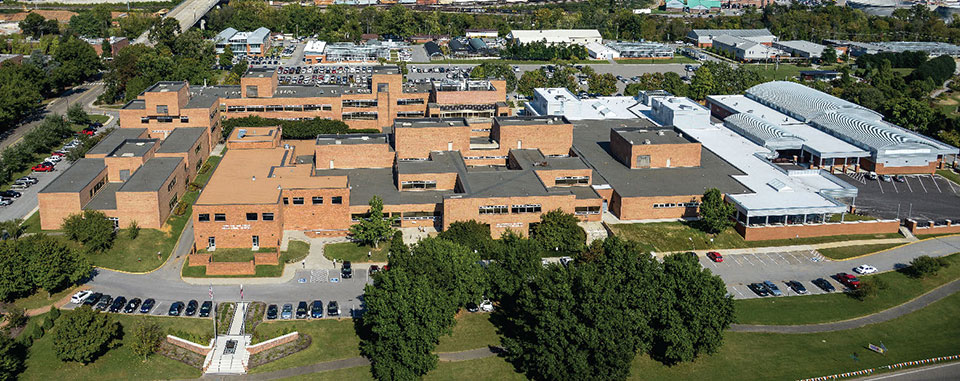
The University of Tennessee College of Veterinary Medicine is accepting applications for two residency positions in anatomic pathology starting July 1st, 2025. The successful applicants will join 4 residents, and 11 training faculty including 8 boarded anatomic pathologists and 3 boarded clinical pathologists in the city of Knoxville, TN located at the base of the Smoky Mountains.
This 3-year residency emphasizes a solid diagnostic pathology foundation for a successful career in veterinary pathology and certification by the American College of Veterinary Pathologists. Case material comes from our active necropsy and surgical pathology services. The necropsy caseload is approximately 30% small animal, 40% large animal, and 30% zoo, exotic, wildlife, and lab animal.
Weekly journal club, gross, microscopic, and special topic rounds supplement resident learning. Teaching anatomic pathology to veterinary students, presenting at regional and national meetings, and conducting a small resident project leading to publication are expected of the successful candidates. Following residency, opportunities for advanced biomedical research training leading to a PhD degree are also available through the Comparative and Experimental Medicine graduate program.
Candidates must hold a professional degree from an AVMA accredited institution, be fluent in written and spoken English, have a strong academic record, and have a documented interest in and commitment to pathology. The salary will be approximately $38,000 with an annual $500 raise, and the benefits package is competitive. The appointment is renewable on an annual basis (three years total).
Applications should include:
- Curriculum vitae
- Personal statement
- This should include your expectations of a residency program and your future professional goals. We encourage you to also describe your anticipated contributions to the program. This may include how your life experiences, background, past activities or unique personal characteristics would contribute to our program in meaningful ways.
- Veterinary school transcript
- Three letters of reference, preferably from board certified anatomic pathologists
Complete applications submitted prior to October 1, 2024, will receive full consideration. Top candidates may be asked to complete a Zoom interview and we will aim to notify the successful candidates by November 15, 2024. The University of Tennessee is an EEO/AA/Title VI/Title IX/Section 540/ADA/ADEA employer.
Please send application materials to:
Mrs. Deborah Hill
Department of Biomedical and Diagnostic Sciences
University of Tennessee College of Veterinary Medicine
2407 River Drive Knoxville TN 37996-4542
Email: dhill20@utk.edu
Phone: 865-974-8235 Fax: 865-974-5616
To schedule an externship please contact Ashley Dalton at adalto20@utk.edu providing your name, the institution you are attending, a mailing address, daytime telephone number, your e-mail address, and the clinical rotation and dates you wish to reserve.
Informal inquiries can be directed to the Residency Director, Dr. Wesley Sheley at wsiniard@utk.edu.
The next clinical pathology residency will in the Department of Biomedical and Diagnostic Sciences (BDS) will be available August 2026.
This is a 3-year program designed to fulfill training requirements and eligibility for board certification by the American College of Veterinary Pathologists (ACVP); residents have the option to pursue graduate work and a Master’s degree with tuition support from the College (graduate degree work is not open to residents here on a J-1 visa). Residency training will emphasize diagnostic cytology, hematology, clinical chemistry, and laboratory quality management. It will also include time on surgical biopsy and endocrinology services, and opportunities for involvement in research. The resident will participate in diagnostic service, teaching of veterinary students, journal club, rounds, and seminars, and will be encouraged to attend and present at national meetings and write manuscripts for publication. More information about the program is available upon request.
The Department of BDS currently has three faculty clinical pathologists and seven faculty anatomic pathologists. Our clinical pathology diagnostic service is supported by a well-equipped laboratory with a staff that includes five ASCP-certified medical technologists, and a diverse caseload with submissions from within the teaching hospital and from outside practices.
The University of Tennessee is committed to equal employment opportunity and affirmative action.
This position is open to US citizens, permanent residents (those holding a green card), or foreign applicants who are eligible for a J-1 visa (no direct interaction with live patients is allowed by those here on a J-1 visa). In addition, candidates for the position must meet the eligibility requirements for the ACVP certifying examination.
An internship or practice experience is desirable but not required.
The residency has a starting salary of $33,000. The appointment is renewable on an annual basis (three years total), assuming satisfactory performance. Currently the salary in the 2nd and 3rd years of the program is $33,500 and $34,000, respectively. A travel stipend of $2,500 and a research stipend of $750 will be provided. Health insurance is available for approximately $200/month (more for spouse and/or children). A parking permit is available for approximately $100/semester.
Applications for the clinical pathology residency should include:
- Curriculum vitae
- Statement of professional goals
- Veterinary school transcript
- Three references (names, titles, email addresses, and phone numbers)
Applications were due by October 1, 2023 and were sent to:
Ms. Donna Longmire
Department of Biomedical and Diagnostic Sciences
University of Tennessee College of Veterinary Medicine
2407 River Drive Knoxville TN 37996-4542
longmire@utk.edu
Informal inquiries are welcome and can be addressed to:
Dr. Nora Springer
Assistant Professor of Clinical Pathology
Clinical Pathology Residency Coordinator
nspringer@utk.edu.
The University of Tennessee is an EEOA/AA/TitleVI/Title IX/Section 504/ADA/ADEA employer.